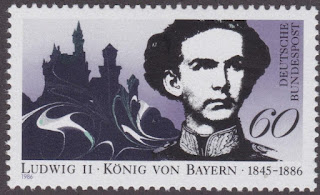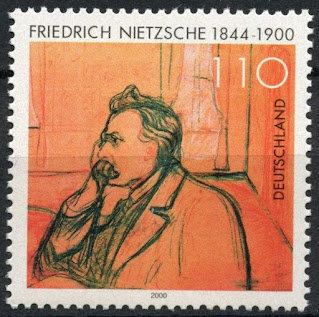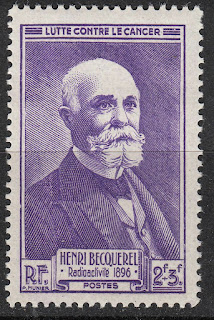Here are some events that happened on August 25th. It could be an event or a person that died or was born on that day
1845 Born: Ludwig II of Bavaria (d. 1886)
Ludwig II (German: Ludwig Otto Friedrich Wilhelm; English: Louis Otto Frederick William; 25 August 1845 – 13 June 1886) was King of Bavaria from 1864 until his death in 1886. He is sometimes called the Swan King or der Märchenkönig ("the Fairy Tale King"). He also held the titles of Count Palatine of the Rhine, Duke of Bavaria, Duke of Franconia, and Duke in Swabia.
Ludwig succeeded to the throne in 1864, aged 18. Two years later, Bavaria and Austria fought a war against Prussia lasting only a matter of weeks, which they lost. However, in the Franco-Prussian War of 1870, Bavaria sided with Prussia against France, and after the Prussian victory, it became part of the new German Empire led by Prussia. Though Bavaria retained a degree of autonomy on some matters within the new German Reich, Ludwig increasingly withdrew from day-to-day affairs of state in favour of extravagant artistic and architectural projects. He commissioned the construction of two lavish palaces and Neuschwanstein Castle, and he was a devoted patron of the composer Richard Wagner. Ludwig spent all his royal revenues (although not state funds as is commonly thought) on these projects, borrowed extensively, and defied all attempts by his ministers to restrain him. This extravagance was used against him to declare him insane, an accusation that has since come under scrutiny. Today, his architectural and artistic legacy includes many of Bavaria's most important tourist attractions.
German stamp depicting King Ludwig II of Bavaria
Ludwig succeeded to the throne in 1864, aged 18. Two years later, Bavaria and Austria fought a war against Prussia lasting only a matter of weeks, which they lost. However, in the Franco-Prussian War of 1870, Bavaria sided with Prussia against France, and after the Prussian victory, it became part of the new German Empire led by Prussia. Though Bavaria retained a degree of autonomy on some matters within the new German Reich, Ludwig increasingly withdrew from day-to-day affairs of state in favour of extravagant artistic and architectural projects. He commissioned the construction of two lavish palaces and Neuschwanstein Castle, and he was a devoted patron of the composer Richard Wagner. Ludwig spent all his royal revenues (although not state funds as is commonly thought) on these projects, borrowed extensively, and defied all attempts by his ministers to restrain him. This extravagance was used against him to declare him insane, an accusation that has since come under scrutiny. Today, his architectural and artistic legacy includes many of Bavaria's most important tourist attractions.
German stamp depicting King Ludwig II of Bavaria
1900 Died: Friedrich Nietzsche, German philologist, philosopher, and critic (b. 1844)
Friedrich Wilhelm Nietzsche (15 October 1844 – 25 August 1900) was a German philosopher, cultural critic, composer, poet, and philologist whose work has exerted a profound influence on modern intellectual history. He began his career as a classical philologist before turning to philosophy. He became the youngest person ever to hold the Chair of Classical Philology at the University of Basel in 1869 at the age of 24. Nietzsche resigned in 1879 due to health problems that plagued him most of his life; he completed much of his core writing in the following decade. In 1889, at age 44, he suffered a collapse and afterward a complete loss of his mental faculties. He lived his remaining years in the care of his mother until her death in 1897 and then with his sister Elisabeth Förster-Nietzsche. Nietzsche died in 1900.
Nietzsche's writing spans philosophical polemics, poetry, cultural criticism, and fiction while displaying a fondness for aphorism and irony. Prominent elements of his philosophy include his radical critique of truth in favor of perspectivism; genealogical critique of religion and Christian morality and related theory of master–slave morality; aesthetic affirmation of existence in response to the "death of God" and the profound crisis of nihilism; notion of the Apollonian and Dionysian; and characterization of the human subject as the expression of competing wills, collectively understood as the will to power. He also developed influential concepts such as the Übermensch and the doctrine of eternal return. In his later work, he became increasingly preoccupied with the creative powers of the individual to overcome social, cultural and moral contexts in pursuit of new values and aesthetic health. His body of work touched a wide range of topics, including art, philology, history, religion, tragedy, culture, and science, and drew early inspiration from figures such as philosopher Arthur Schopenhauer, composer Richard Wagner, and writer Johann Wolfgang von Goethe.
After his death, his sister Elisabeth became the curator and editor of Nietzsche's manuscripts. She edited his unpublished writings to fit her German nationalist ideology while often contradicting or obfuscating Nietzsche's stated opinions, which were explicitly opposed to antisemitism and nationalism. Through her published editions, Nietzsche's work became associated with fascism and Nazism; 20th-century scholars contested this interpretation and corrected editions of his writings were soon made available. Nietzsche's thought enjoyed renewed popularity in the 1960s and his ideas have since had a profound impact on 20th and early-21st century thinkers across philosophy—especially in schools of continental philosophy such as existentialism, postmodernism and post-structuralism—as well as art, literature, psychology, politics, and popular culture.
German stamp depicting Friedrich Nietzsche
1908 Died: Henri Becquerel, French physicist and chemist, Nobel Prize laureate (b. 1852)
Antoine Henri Becquerel (15 December 1852 – 25 August 1908) was a French engineer, physicist, scientist, Nobel laureate, and the first person to discover evidence of radioactivity. For work in this field he, along with Marie Skłodowska-Curie (Marie Curie) and Pierre Curie, received the 1903 Nobel Prize in Physics.
In 1889, Becquerel became a member of the Académie des Sciences. In 1900, Becquerel won the Rumford Medal for his discovery of the radioactivity of uranium and he was made an Officer of the Legion of Honour. The Berlin-Brandenburg Academy of Sciences and Humanities awarded him the Helmholtz Medal in 1901. In 1903, Henri shared a Nobel Prize in Physics with Pierre Curie and Marie Curie for the discovery of spontaneous radioactivity. In 1905, he was awarded the Barnard Medal by the U.S. National Academy of Sciences. In 1906, Henri was elected Vice Chairman of the academy, and in 1908, the year of his death, Becquerel was elected Permanent Secretary of the Académie des Sciences. During his lifetime, Becquerel was honored with membership into the Accademia dei Lincei and the Royal Academy of Berlin. Becquerel was elected a Foreign Member of the Royal Society (ForMemRS) in 1908. Becquerel has been honored with being the namesake of many different scientific discoveries. The SI unit for radioactivity, the becquerel (Bq), is named after him. There is a crater named Becquerel on the Moon and also a crater named Becquerel on Mars. The uranium-based mineral becquerelite was named after Henri.
French stamp depicting Henri Becquerel



No comments:
Post a Comment